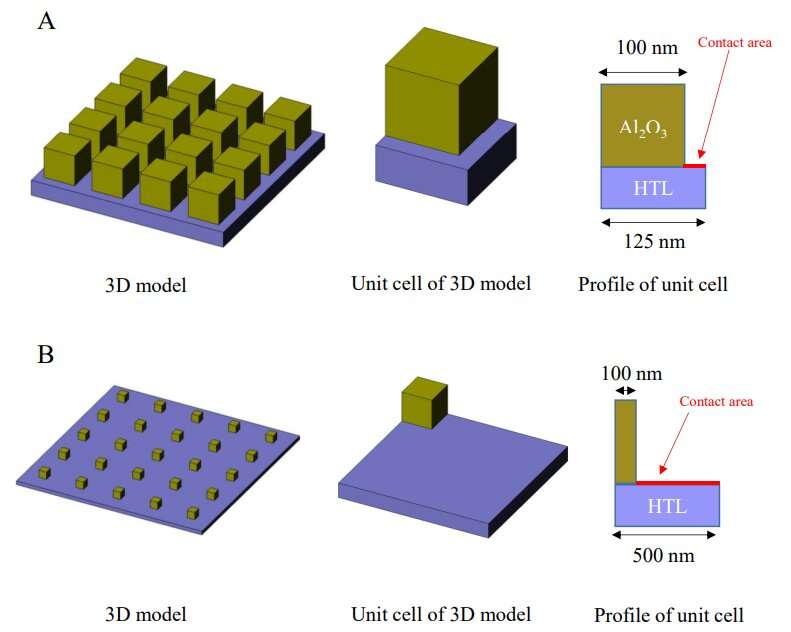Schematic representation of 2D PIC model simplified from 3D periodical structure for dielectric width d=100 nm with a spacing of (A) 25 nm and (B) 400 nm. Arrow indicates the contact area (opening area) between perovskite and HTL. Credit: Science (2023). DOI: 10.1126/science.ade3126
A research team led by Prof. Xu Jixian from the University of Science and Technology of China (USTC) of the Chinese Academy of Sciences (CAS) designed and fashioned a novel porous insulator contact (PIC) for perovskite solar cells. The PIC ameliorated the non-radiative charge recombination effect and the corresponding solar cell achieved an efficiency of up to 25.5%. The study was published in Science.
Conventional strategies reducing charge recombination at photocurrent transport interface are dominated by insertion of an ultrathin (~1 nm) passivation layer, which is a low-conductive material between photo-absorbers and hole transfer layers (HTLs). However, given that a slight increase in the thickness of passivation layer results in drastic decrease in photocurrent transport, a trade-off always exists between passivation and transport.
In this study, researchers attempted to break this trade-off by introducing PIC into perovskite solar cells. PIC is a thick (~100 nm) dielectric layer with random nanoscale openings. Photocurrent transport was not sacrificed because the current transported through the openings in PIC instead of a tunneling effect. Further measurement also confirmed that the surface recombination velocity (SRV) was reduced by nearly seven times, which demonstrated successful passivation.
In addition, researchers investigated the origin of the superior performance of PIC. They discovered that the reduction of recombination was a result of both reduced surface area and passivation effect. Surface wetting between PIC and perovskite layer was improved, which yielded higher perovskite crystallization quality and thus longer bulk recombination lifetime.
This study provides a new strategy in reducing charge recombination and improving power conversion efficiency. Researchers also noted that with further improvement of PIC structure, the efficiency could be even higher.
More information: Wei Peng et al, Reducing nonradiative recombination in perovskite solar cells with a porous insulator contact, Science (2023). DOI: 10.1126/science.ade3126
Journal information: Science
Provided by Chinese Academy of Sciences
























